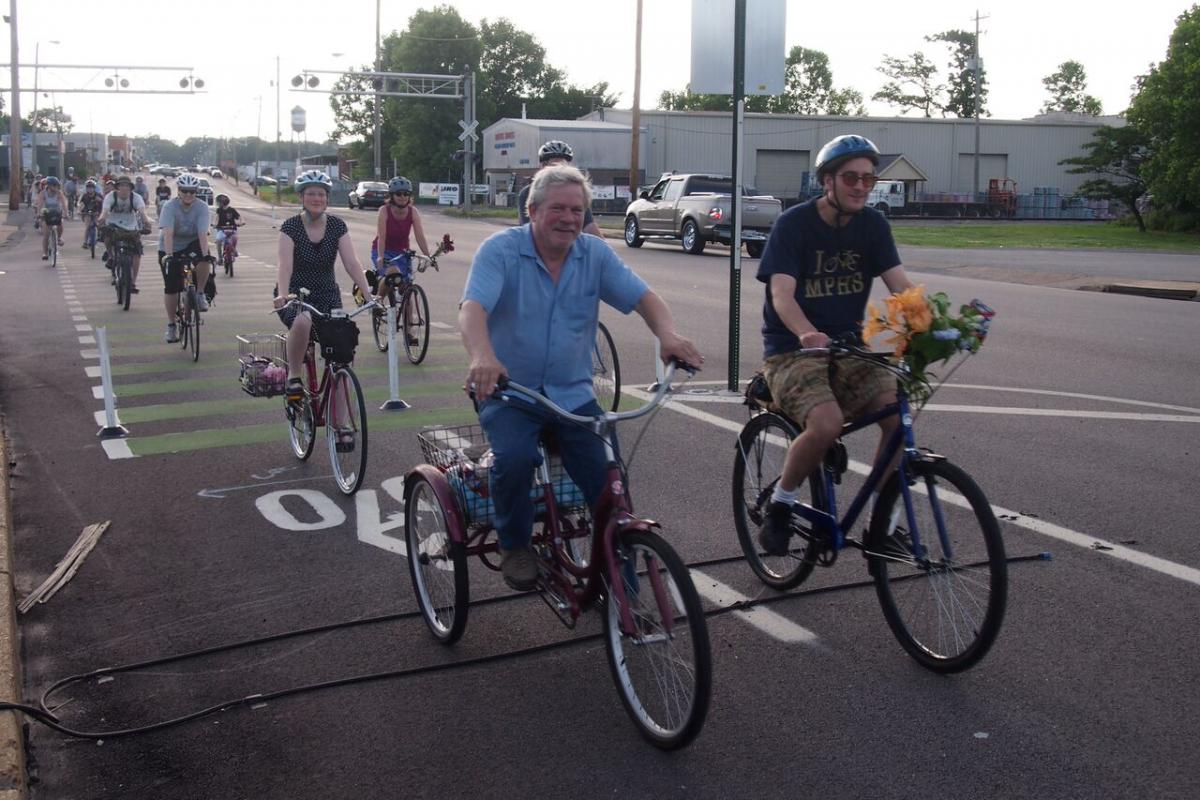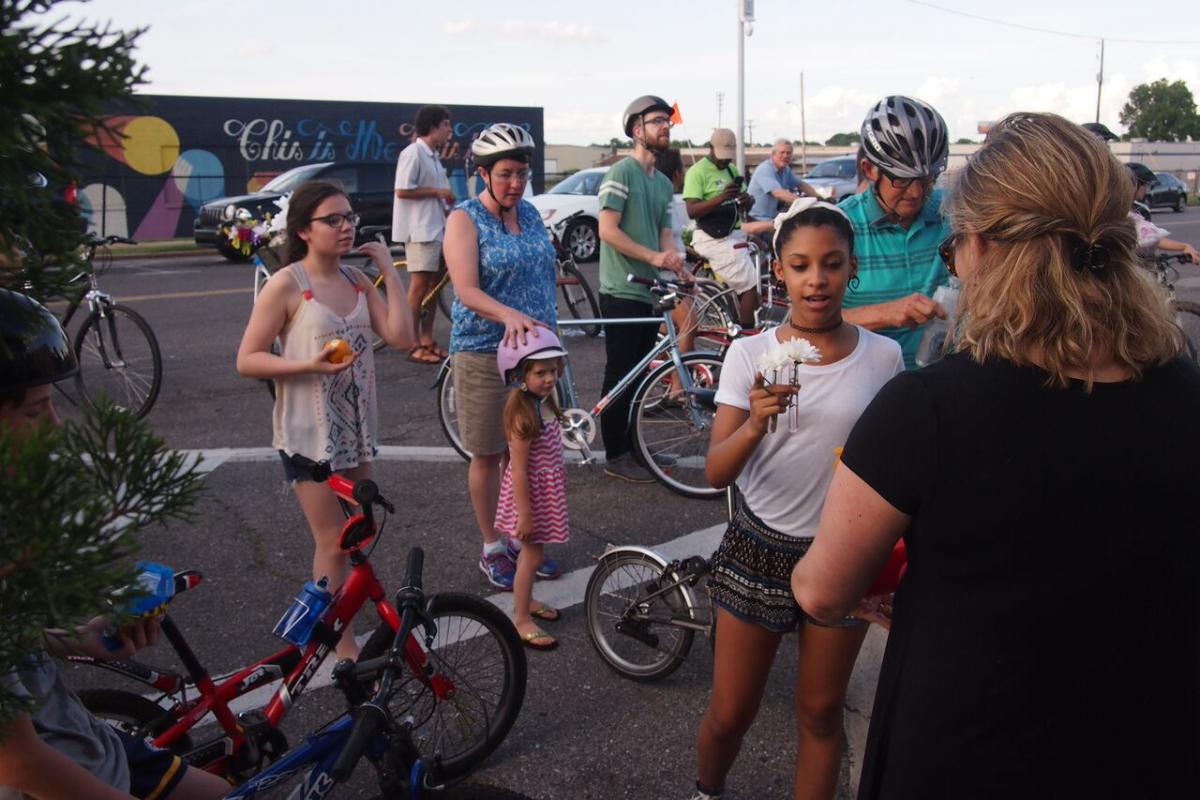DISCOVER YOUR LOCAL BICYCLING COMMUNITY
Find local advocacy groups, bike shops, instructors, clubs, classes and more!
BFC Spotlight: Memphis
This week, we announced the latest round of Bicycle Friendly Communities. Memphis, TN, is one of the 42 new and renewing communities this round, and the new Bronze-level community is aiming to be the best in all of Tennessee. The effort has been spearheaded from many angles, including the city government and a robust advocacy group. We caught up with Kyle Wagenschutz, the city’s bicycle and pedestrian coordinator, and with John Paul Shaffer, Program Director at Livable Memphis, to talk more about what this award means to the city and where they will go from here to reach Silver!

Photo courtesy of the City of Memphis
1.What does this award mean to you and to Memphis?
KW: First of all, designation as a Bicycle Friendly Community by the League of American Bicyclists is a great recognition of the positive efforts put forth by local advocates, community leaders, elected officials, and city staffers working to create an environment where riding a bicycle is a normal part of everyday life in Memphis. Second, it’s a great tool to benchmark the work that is being done against our peers throughout the United States so that we can continue to learn from other on best practices and strategies for future improvement. Finally, it’s a great honor by which all those riding bicycles in Memphis can be proud -– considering just a few short years ago we were considered one of the worst cities in the U.S. for riding a bicycle.
We’ve seen a sea change in local government administration into fully embracing bicycling as an integral part of the transportation system
JPS: It’s great to see recognition and, in a sense, validation, of the great work that’s been happening in Memphis over the past five years or so. We’ve seen a sea change in local government administration into fully embracing bicycling as an integral part of the transportation system, and welcoming advocates into that process. That has translated into noticeable shifts in the attitudes towards people on bikes on the streets and in the general consciousness of Memphians. It’s a real sign of progress to be designated a Bronze level BFC; at the same time it’s also a great reminder that we have room for improvement. The evaluation process in and of itself is a valuable tool for figuring out our next steps for becoming an even friendlier city for people on bikes.
2. What was the city’s biggest accomplishment in the past year?
KW: In the last year the city has worked to create nearly five miles of protected bike lanes along major arterial streets and completed the development of a Complete Streets Project Delivery Manual, which makes protected bicycle lanes the default infrastructure type for all future arterial roadway projects. Our Wolf River Greenway trails system measured nearly 200,000 users in the last 12 months, and our first on-street bike corral was installed near our first Platinum-Level Bicycle Friendly Business, First Congregational Church of Memphis.
JPS: On the policy side, definitely finishing the Memphis Complete Streets Project Delivery Manual. Livable Memphis and the City partnered on a federal grant through our Office of Sustainability to develop the guide. The project was a huge opportunity for advocacy to work directly with government, the development community, and other local partners to really reorient how we approach public spaces for transportation, safety, and livability.
I can’t leave out some of our biggest and best infrastructure projects to date! In the past year, we broke ground on two innovative projects – the Hampline cycle track will connect 4,500 acre Shelby Farms Park and Overton Park in the core of the city. From there, you’ll be able to take our growing network of bike lanes to the Harahan Bridge, where the Big River Crossing will take you across the Mississippi River into Arkansas. I’d challenge anyone to find a better view of the Memphis skyline!

Photo courtesy of the City of Memphis
3. What’s on the to-do list for the next year?
KW: We’ve have about 60 miles of new on-street bicycle infrastructure funded with assistance of federal transportation grants that are currently in design. All of those projects, of which 20 miles will be protected bicycle lanes, are scheduled to be constructed beginning in 2016. Additionally, we hope to continue to build upon the growing diversity of bicycle users in Memphis with continued work and expansion of projects like the Chelsea Avenue Greenline, Wolf River Greenway, and South Memphis Greenline, which will provide new opportunities for riding in some of our traditionally underserved areas.
JPS: We’re excited to be convening and expanding a citywide network of active transportation advocates to figure out how bicycling, walking, and transit advocacy can support efforts toward a more equitable transportation network. Access to jobs is a huge issue for a lot of Memphians, and there’s a lot of thought now going into how people get from home to work, whether it’s by improving bicycle access to transit or looking at employer based strategies for encouraging different commuting options.
We’re also excited to be a part of the city-wide Explore Bike Share project that was just launched here in Memphis. We’ll be taking several months to really envision how bike share could work in Memphis, what that system would look like, and how it can connect people and communities, whether for tourism, access to economic opportunities, or just getting more bikes on the road!
4. Nashville also received an award this year — how does competition factor into your efforts? How do you view Memphis in comparison to its regional neighbors in terms of bike-friendliness?
KW: Certainly, we look often at our regional neighbors like Nashville, Austin, Atlanta, Charlotte, and others to measure the validity, pace, and scope of work occurring locally. To an extent, we even look to other cities as a metric of making sure we’re doing the basics right. From there, we can say, “what aren’t they doing and how can we be the first to do it?” Competition drives innovation, but not in a mean-spirited way. Memphis is continually communicating and sharing ideas with its counterparts across the southeastern United States. Measured across the state of Tennessee, we see how protected bicycle lanes and the desire to install the first bike box, bicycle signal head, or two-way protected bike lanes is driving municipal staff in Nashville, Knoxville, Chattanooga, and Memphis to continually challenge each other in embracing innovation and moving towards greater levels of bicycle friendliness. The end result is a region moving towards greater levels of acceptance of bicycling as a normal, rational part of everyday life in the southeast and in Memphis.
JPS: I don’t know if I’d call it competition (OK, sure I would) or encouragement -– we have so many great cities in Tennessee and throughout the Southeast working to improve active transportation. It’s been inspiring to get to learn from and share stories with them -– it brings support, motivation, and greater capacity for us and our friends in the region. Ultimately we’re all working toward a common goal –- making cities work best for all their residents. Just to be clear, though –- Memphis is definitely the best around!